Ukraine profile - Timeline
TO SEE VIDEOS:
- 27 October 2015
- Europe
A chronology of key events
1917 - Central Rada (Council) set up in Kiev following collapse of Russian Empire.
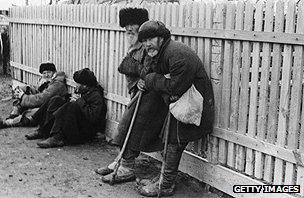 Getty Images
Getty Images
1918 - Ukraine declares independence: Ukrainian People's Republic set up. Numerous rival governments vie for control for some or all of Ukraine during ensuing civil war.
1921 - Ukrainian Soviet Socialist Republic established as Russian Red Army conquers two-thirds of Ukraine. Western third becomes part of independent Poland.
1932 - Approximately 7 million peasants perish in man-made famine during Stalin's collectivisation campaign.
1937 - Mass executions and deportations as Stalin launches purge against intellectuals.
1941 - Ukraine suffers terrible wartime devastation as Nazis occupy the country until 1944. More than 5 million Ukrainians die fighting Nazi Germany. Most of Ukraine's 1.5 million Jews wiped out by the Nazis.
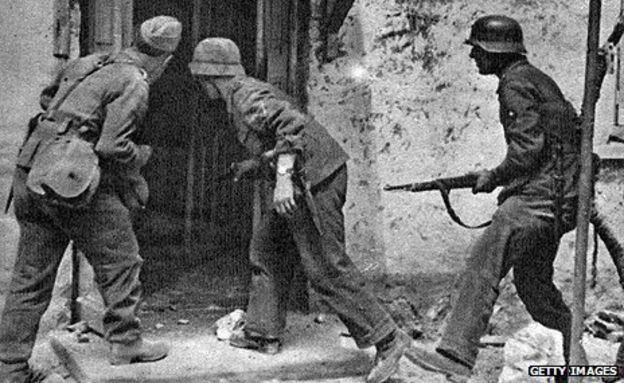 Getty Images
Getty Images
1944 - Stalin deports 200,000 Crimean Tatars to Siberia and Central Asia following accusations of collaboration with Nazi Germany.
1945 - Allied victory in World War II leads to conclusive Soviet annexation of western Ukrainian lands.
1954 - In a surprise move, Soviet leader Nikita Krushchev transfers the Crimean peninsula to Ukraine as a "gift".
Armed resistance to Soviet rule ends with capture of last commander of Ukrainian Insurgent Army (UPA).
1960s - Increase in covert opposition to Soviet rule, leading to repression of dissidents in 1972.
1986 - A reactor at the Chernobyl nuclear power station explodes, sending a radioactive plume across Europe. Desperate efforts are made to contain the damaged reactor within a huge concrete cover. Many armed forces personnel die of radiation sickness.
1988 - Prominent writers and intellectuals set up Ukrainian People's Movement for Restructuring (Rukh).
1990 - Student protests and hunger strikes bring down government of Vitaliy Masol.
Independence
1991 - Ukraine declares independence following attempted coup in Moscow: 90% vote for independence in nationwide referendum in December.
Early to mid 1990s - About 250,000 Crimean Tatars and their descendants return to Crimea following collapse of Soviet Union.
1994 - Presidential elections: Leonid Kuchma succeeds Leonid Kravchuk.
1996 - New, democratic constitution adopted. New currency, the hryvna, introduced.
1997 - Friendship treaty signed with Russia. Ukraine and Russia also reach agreement on the Black Sea fleet.
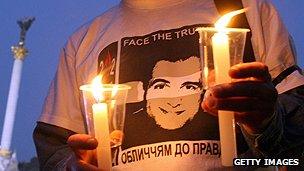 Getty Images
Getty Images
1999 - Death penalty abolished. Nationalist leader Vyacheslav Chornovil killed in car crash. President Kuchma re-elected.
2000 - Chernobyl nuclear power plant is shut down, 14 years after the accident. Well over ten thousand people have died as a direct result of the explosion, the health of millions more has been affected.
2001 February - The European Union calls for an inquiry into the murder of investigative journalist Georgiy Gongadze. Opposition demonstrations allege that President Kuchma was involved and call for his impeachment. President Kuchma denies the allegations.
2001 April - Viktor Yushchenko government dismissed following no-confidence vote in parliament. Mr Yushchenko was respected in the West for fighting corruption, pushing ahead with economic reforms and working to attract investment, but was unpopular with powerful Ukrainian businessmen.
2001 June - Pope John Paul II makes first visit to Ukraine amid protests by Orthodox Christians in Ukraine and Russia against the visit.
2001 October - Ukrainian military accidentally shoot down Russian air liner over the Black Sea, killing all 78 on board. Defence Minister Olexander Kuzmuk resigns.
2002 March - General election results in hung parliament. Parties opposed to President Kuchma allege widespread electoral fraud.
2002 May - Leadership announces decision to launch formal bid to join Nato.
2002 September - Opposition stages mass protests demanding resignation of President Kuchma whom they accuse of corruption and misrule.
Relations with the West are strained after US officials authenticate recordings in which they say Kuchma is heard to approve the sale of early-warning radar systems to Iraq. On the same tapes, recorded over two years previously, Kuchma is also allegedly heard ordering an official to "deal with" journalist Georgiy Gongadze.
2002 November - President Kuchma sacks Prime Minister Kinakh. Viktor Yanukovych, governor of Donetsk region, appointed to replace him. He promises to fight poverty and work for integration into Europe.
2003 March - Tens of thousands of people join Kiev demonstrations demanding that Kuchma resign.
2004 June - Consortium in which President Kuchma's son-in-law Viktor Pinchuk plays key role buys Krivorizhstal, the country's largest steel mill, for a bargain price.
2004 August - Ukraine ignores protests from EU and Romania by opening canal in the Danube delta which will link with Black Sea, rejecting claims that it will cause environmental damage.
"Orange Revolution"
2004 November - Official count indicates presidential election victory for Prime Minister Viktor Yanukovych. Western and other independent observers report widespread vote rigging. Opposition candidate Viktor Yushchenko launches campaign of mass street protest and civil disobedience. Supreme Court later annuls result of poll.
2004 December - Opposition candidate Viktor Yushchenko tops poll in election re-run. Rival candidate Viktor Yanukovych challenges result but resigns as prime minister.
2005 January - Viktor Yushchenko sworn in as president after Supreme Court rejects challenge by losing candidate Mr Yanukovych.
2005 February - President's nominee Yulia Tymoshenko overwhelmingly approved as prime minister by parliament.
2005 Februrary - Court annuls June 2004 sale of Krivorizhstal.
2005 March - President Yushchenko announces that suspected killers of journalist Georgiy Gongadze are in custody. He also accuses the former authorities of a cover-up.
Former Interior Minister Kravchenko, who had been due to give evidence in Gongadze investigation, shot dead in apparent suicide.
Tymoshenko sacked
2005 September - President Yushchenko dismisses the government of Yulia Tymoshenko. Parliament approves Yuri Yekhanurov as her successor.
2005 October - Krivorizhstal reauctioned. Mittal Steel pays six times the price paid for it when it was originally put up for sale.
Gas price row
2006 January - Russia briefly cuts supply of gas for Ukrainian use in row over prices. Moscow says its reasons are purely economic but Kiev says they are political.
Previously agreed changes to constitution shift some significant powers from the president to parliament.
The trial of three former policemen charged with killing opposition journalist Georgiy Gongadze begins in Kiev.
2006 March - Viktor Yanukovych's party tops polls in parliamentary elections. Yulia Tymoshenko's takes second place, leaving President Yushchenko's trailing in third.
Political wrangles
2006 June-July - After months of bargaining, the backers of the Orange Revolution - the Yushchenko and Tymoshenko blocs and the Socialists - agree on a coalition, but the deal collapses. The Socialists opt instead for a coalition with Viktor Yanukovych's Party of Regions and the Communists.
2006 August - Faced with a deadline to accept Viktor Yanukovych's nomination or call new elections, President Yushchenko agrees that his rival can become prime minister.
2007 February - Boris Tarasyuk, a close ally of the president and a strong advocate of strong ties with Europe and Nato, resigns as foreign minister after a protracted row with parliament.
2007 September - Parliamentary elections. No clear winner emerges, although pro-Russian parties gain a narrow majority.
Tymoshenko returns
2007 December - Yulia Tymoshenko is appointed prime minister again, in coalition with President Yushchenko's party.
2008 March - Russia's state-owned company, Gazprom, agrees new contract to supply Ukraine's industrial consumers directly, ending row over gas supply.
Economic woes
2008 October - Global financial crisis leads to decline in demand for steel, causing price of one of the country's main exports to collapse. Value of Ukrainian currency falls sharply and investors pull out.
The International Monetary Fund (IMF) offers Ukraine a loan of $16.5bn (£10.4bn) to help it weather the storm.
2009 January - Russia stops all gas supplies to Ukraine after collapse of talks to end row over unpaid bills and prices, leading to shortages in southeast Europe. Supplies are restored a week later when Ukraine and Russia sign a 10-year deal on gas transit.
2009 July - Ukrainian security service says a key suspect in the murder of the opposition journalist Georgiy Gongadze in 2000 has been arrested and has confessed to the killing.
2009 December - Ukraine and Russia sign deal on oil transit for 2010, allaying fears of supply cuts to Europe.
Yanukovych comeback
2010 February - Viktor Yanukovych is declared winner of second round of presidential election. His main rival, Prime Minister Yulia Tymoshenko, refuses to accept the result, alleging fraud.
2010 March - Yulia Tymoshenko steps down from the premiership after a number of her supporters in parliament switch sides and she loses a no-confidence vote. President Yanukovych appoints his long-standing ally Mykola Azarov to succeed her.
2010 April - Ukraine agrees to eliminate its stockpile of weapons-grade nuclear material ahead of the Washington nuclear security summit.
Parliament ratifies an agreement to extend Russia's lease on the Black Sea fleet base at Sevastopol in Crimea for 25 years, in return for cheaper gas imports.
2010 June - Parliament votes to abandon Nato membership aspirations.
2010 July - International media freedom watchdogs criticise a Kiev court's decision to cancel the allocation of broadcasting frequencies to two privately-run TV channels.
2010 August - IMF approves fresh $15bn (£9bn) loan for Ukraine, subject to the government curbing the subsidising of utilities bills.
2010 October - Constitutional court overturns limits on presidential power introduced in 2004.
2010 November - President Yanukovych vetoes a tax reform that had prompted thousands of business owners and opposition activists to protest in city centres nationwide. The reform was part of austerity measures demanded by the IMF as a condition of the bailout approved in August.
2010 December - Former Prime Minister Yulia Tymoshenko and Interior Minister Yuriy Lutsenko are charged with abuse of state funds. Both deny the charges and say they are politically motivated.
2011 March - Ex-President Leonid Kuchma is charged over the 2000 murder of journalist Georgiy Gongadze. He denies any part in the killing.
The IMF puts its $15bn bailout on hold in response to the government's failure to pass a pension reform bill and its watering down of gas price increases.
2011 April - The main suspect in the Gongadze killing, former interior minister official Olexiy Pukach, goes on trial. He is said to have confessed to strangling and beheading Gongadze.
2011 October - A court jails former PM Tymoshenko after finding her guilty of abuse of power over a gas deal with Russia in 2009. EU warns Ukraine of "profound implications".
2011 May-June - Ukraine postpones summit of Central and East European leaders in Yalta after several leaders boycott it over the mistreatment of opposition leader Yulia Tymoshenko in prison. Others boycott the Euro 2012 football championship.
2012 July - The European Court of Human Rights condemns the detention of former interior minister Yuriy Lutsenko and demands his release and compensation.
Police in Kiev fire tear gas to disperse hundreds of protesters angry at a law pushed through parliament with little debate that gives Russian regional language status.
2012 October - First parliamentary elections since President Yanukovych came to power see a decisive win for his governing Party of Regions and a surprise boost for the far-right Freedom party. OSCE observers, the United States and the European Union express concern at the conduct of the poll.
2012 December - Government resigns to allow a number of ministers, including Prime Minister Mykola Azarov, to take up seats in parliament. Government remains in office on an acting basis.
2013 April - European Court of Human Rights rules unanimously that the arrest and detention of Yulia Tymoshenko in 2011 was unlawful.
New revolution
2013 July - Russia halts imports of chocolate from one of Ukraine's main confectionary makers, Roshen, saying its products fall below safety standards, in what is seen as retaliation for Ukraine's efforts to integrate further with the EU.
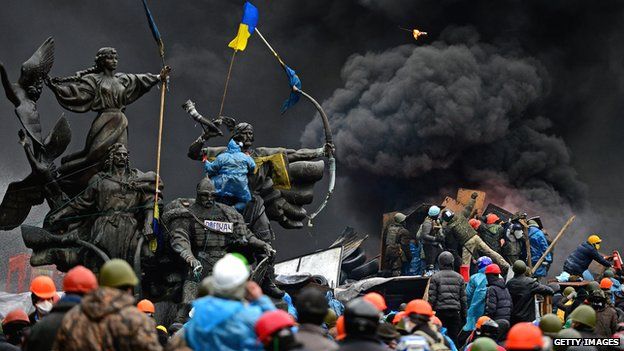 Getty Images
Getty Images
2013 November - Tens of thousands of protesters take to the streets of central Kiev and other cities to protest at the government's sudden decision to abandon plans to sign an association agreement with the EU. They accuse the government of bowing to Russian pressure, as well as being corrupt and unaccountable.
2013 December - Russia agrees to slash price of gas supplied to Ukraine and lend $15bn to mollify protesters.
2014 February - Security forces kill at least 77 protesters in Kiev. President Yanukovych flees to Russia, opposition takes control under interim president Olexander Turchynov and acting prime minister Arseny Yatseniuk. Russia refuses to recognise takeover.
Russia annexes Crimea
2014 March - Russian forces seize and then annex Crimea, prompting biggest East-West showdown since Cold War. US and European Union begin process of imposing ever-harsher sanctions on Russia.
2014 April - Pro-Russian separatists seize parts of eastern Donetsk and Luhansk regions on Russian border. Government launches military operation in response.
2014 May - Leading businessman Petro Poroshenko wins presidential election on pro-Western platform. Signs delayed EU association accord in July.
2014 July - A Malaysian airliner comes down in separatist-held territory, killing all 298 people on board, with all evidence suggesting that it was shot down.
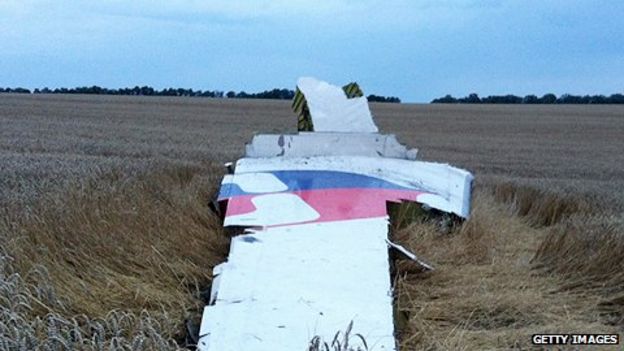 Getty Images
Getty Images
2014 August - Russia sends first of several unauthorised convoys allegedly carrying aid to Donestsk and Luhansk, amid Western and Ukrainian suspicions that they serve an ulterior purppose.
2014 September - Government signs Minsk peace plan ceasefire with pro-Russian leaders in eastern Ukraine. The two separatist regions agree to hold local elections under Ukrainian law in December.
2014 September - November - Cease-fire repeatedly violated before breaking down completely. Nato confirms Russian troops and heavy military equipment entering eastern Ukraine.
2014 October - Parliamentary elections produce convincing majority for pro-Western parties, which begin process of forming a new coalition led by Prime Minster Arseny Yatseniuk.
2014 November - Donetsk and Luhansk separatists hold elections not provided for by Minsk plan. Ukraine rescinds pledge for regional autonomy in response.
2015 January - Separatists capture remains of Donetsk airport in renewed offensive.
2015 February - Germany and France broker new ceasefire deal at talks in Belarus, resulting in a fragile lull in fighting after Russian-backed separatists drive Ukrainian troops out of the transport hub of Debaltseve.
2015 June - Ukraine suspends gas purchases from Russia after talks on the price to be paid for the next three months break down.2015 October - Ukraine bans Russian commercial flights into the country, Russia responds in kind. First round of local elections held, with run-offs due in November. Voting does not take place in Russian-occupied Crimea, areas of Donetsk and Luhansk regions under control of pro-Russian forces, and also eastern city of Mariupol where there is a dispute over ballot papers.
No comments:
Post a Comment
Please leave a comment-- or suggestions, particularly of topics and places you'd like to see covered